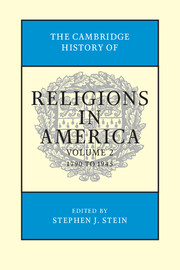Book contents
- Frontmatter
- Contents
- Contributors
- Editor's Introduction
- SECTION I RELIGION IN NORTH AMERICA
- SECTION II RELIGIONS IN THE NEW NATION, 1790–1865
- 5 Religious Organization in the New Nation
- 6 Religious and Geographical Expansion, 1790–1865
- 7 Theological Controversies, 1790–1865
- 8 Religion and Conflict from Independence to the Civil War
- 9 African Americans and the Making of Evangelical Christianities, 1760–1860
- 10 Religion and the Civil War
- SECTION III CHANGING RELIGIOUS REALITIES
- SECTION IV RELIGIOUS RESPONSES TO MODERN LIFE AND THOUGHT
- SECTION V COMPARATIVE ESSAYS
- SECTION VI RELIGION AND DIVERSE AREAS
- Index
- References
9 - African Americans and the Making of Evangelical Christianities, 1760–1860
from SECTION II - RELIGIONS IN THE NEW NATION, 1790–1865
Published online by Cambridge University Press: 28 July 2012
- Frontmatter
- Contents
- Contributors
- Editor's Introduction
- SECTION I RELIGION IN NORTH AMERICA
- SECTION II RELIGIONS IN THE NEW NATION, 1790–1865
- 5 Religious Organization in the New Nation
- 6 Religious and Geographical Expansion, 1790–1865
- 7 Theological Controversies, 1790–1865
- 8 Religion and Conflict from Independence to the Civil War
- 9 African Americans and the Making of Evangelical Christianities, 1760–1860
- 10 Religion and the Civil War
- SECTION III CHANGING RELIGIOUS REALITIES
- SECTION IV RELIGIOUS RESPONSES TO MODERN LIFE AND THOUGHT
- SECTION V COMPARATIVE ESSAYS
- SECTION VI RELIGION AND DIVERSE AREAS
- Index
- References
Summary
By the time he escaped from slavery in Maryland in 1838, Frederick Douglass had had his fill of the religious pretensions of his erstwhile masters. In reflecting upon his twenty years of lifelong bondage, he would later, in his perennially popular autobiography, spare no words for his disdain of the variety of Christianity that he had encountered on American plantations. “I … hate the corrupt, slaveholding, women-whipping, cradle-plundering, partial and hypocritical Christianity of this land,” he asserted in the appendix of his published memoir. “I look upon it as the climax of all misnomers, the boldest of all frauds, and the grossest of all libels.” Further, he condemned the apparent hypocrisy of those who would dare instruct others in the ways of moral living and spiritual enlightenment while apologizing for slavery and rationalizing oppression as a positive good. “The man who wields the blood-clotted cowskin during the week fills the pulpit on Sunday, and claims to be a minister of the meek and lowly Jesus.” Even worse, such men denied the slave access to literacy and the Bible, just as they concurrently condoned practices that ruptured enslaved families at the auction block, deprived enthralled couples of the sacrament of marriage, and robbed bondspeople of the fruits of their labors. To assure his readers that his attack upon the turpitude of certain individuals professing to be Christians was not due to any native hostility toward the gospel, Douglass expressed sincere fondness of “the pure, peaceable, and impartial Christianity of Christ….”
- Type
- Chapter
- Information
- The Cambridge History of Religions in America , pp. 178 - 202Publisher: Cambridge University PressPrint publication year: 2000

